July 18
Julio 18
June 13
Junio 13
May 23
Mayo 23
April 25
Abril 25
April 11
Abril 11
March 28
Marzo 28
March 14
marzo 14
February 28
Febrero 28
February 14
Febrero 14
January 31
31 de enero
January 17, 2025
July 18
Julio 18
June 13
Junio 13
May 23
Mayo 23
April 25
Abril 25
April 11
Abril 11
March 28
Marzo 28
March 14
marzo 14
February 28
Febrero 28
February 14
Febrero 14
January 31
31 de enero
January 17, 2025
By Justin McLellan , Catholic News Service
VATICAN CITY (CNS) — Almost four years after Pope Francis opened the Catholic Church’s path toward synodality — a term many in the church had never heard before — his successor has thrown his support behind the last leg of the church’s synodal journey.
The Synod of Bishops, which admitted women, lay and other non-bishop voting members among its ranks during its two universal assemblies in October 2023 and 2024, “naturally retains its institutional profile and at the same time is enriched by the mature fruits of this season,” Pope Leo XIV told the ordinary council of the synod June 26. “You are the body appointed to reap these fruits and make a prospective reflection.”
Over two days, the council convened to approve a document for the synod’s final implementation stage intended to improve dialogue between local churches and the Vatican synod office, the General Secretariat for the Synod of Bishops said in a statement June 30. The document will be released July 7 at www.synod.va.
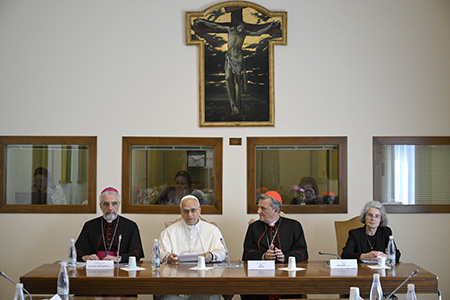
The council also discussed the work of study groups instituted by Pope Francis to deal with hot-button topics — such as women’s ordination and changes to priestly formation.
The study groups were scheduled to present interim reports on their findings in June 2025, but the synod office noted that “due to the death of Pope Francis and the election of Pope Leo XIV, there have been delays.” In agreement with Pope Leo, the deadline to submit the final reports was extended to Dec. 31, 2025, and the interim reports will be published on the synod office’s website as they are received, it said.
According to the apostolic constitution “Universi Dominici Gregis,” which governs procedures when the papacy is vacant, a council or Synod of Bishops is immediately suspended when a pope dies or resigns. All meetings, decisions and promulgations must cease until a new pope explicitly orders their continuation, or they are considered null.
The late pope launched the diocesan phase of the worldwide synodal process in October 2021, and it was originally scheduled to culminate with an in-person assembly in Rome in October 2023. Another assembly was held after a year of listening in October 2024, and in March, Pope Francis launched a three-year implementation phase of the synod that will culminate in an ecclesial assembly at the Vatican in October 2028.
Pope Leo told the synod’s ordinary council June 26, “I encourage you in this work, I pray that it may be fruitful and as of now I am grateful.”
The General Secretariat of the Synod of Bishops said that the expected document, titled “Pathways for the Implementation Phase of the Synod,” is a practical and theological guide for diocesan bishops and synodal teams as they apply the synod’s final proposals locally.
The synod office noted that this phase of the synodal process “belongs above all to the local Churches,” which are tasked with translating the synod assembly’s “authoritative proposals” into concrete pastoral practices within their respective contexts. At the same time, the synod office said the guidelines were developed to respond to questions raised by bishops and diocesan leaders in recent months and are intended to support, not replace, local discernment.
Cardinal Mario Grech, secretary-general of the Synod of Bishops, acknowledged in his opening remarks of the council’s meeting that “difficulties and resistance” to the synodal process remain. He said that while some dioceses have already begun the implementation phase with enthusiasm, others are awaiting the forthcoming guidelines “with trepidation.”
“These contrary positions must not be overlooked,” he said. “Rather, I would say they must challenge us deeply.”
Cardinal Grech proposed establishing a permanent forum, which he called a “Table of Synodality,” to foster ongoing theological and canonical reflection on synodality and encouraged greater investment in formation programs. He also said that new partnerships with academic institutions and the continued support of young theologians would help cultivate a synodal “mentality” across the church.
By Kimberley Heatherington , OSV News
(OSV News) — It’s a question with profound implications for millions of Americans: With the Trump administration’s “One Big Beautiful Bill Act” signed into law July 4, will families thrive or languish? Will poverty increase, or decrease? Will more go hungry, or will more be fed?
In a record-breaking eight-plus hours speech from the floor of the House, Democratic Minority Leader Hakeem Jeffries, D-N.Y. declared, “Republicans are trying to take a chainsaw to Social Security, a chain saw to Medicare, a chain saw to Medicaid, a chainsaw to the health care of the American people, a chain saw to nutritional assistance for hungry children, a chain saw to farm country, and a chainsaw to vulnerable Americans.”
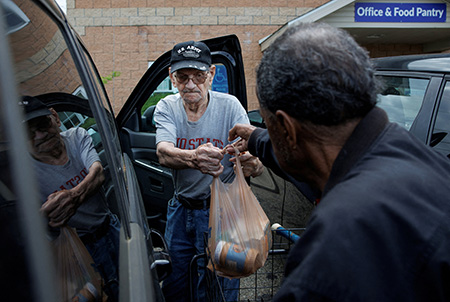
After the bill passed, House Speaker Mike Johnson, R-La., rejected pessimistic evaluations.
“I think a lot of the estimations about what this legislation would do in a negative manner to communities, in my state or any other, are far overblown. I can tell you that this bill is going be a great thing for everybody around the country,” Johnson said. “I think they’re going to feel this pretty quickly. Wages will rise; I think household income will go up; I think the job participation rate will increase dramatically; I think unemployment will be low.”
“This is jet fuel for the economy,” concluded Johnson. “And all boats are going to rise.”
Given dueling political assessments, how should Catholics judge future outcomes of the One Big Beautiful Bill Act?
“A basic moral test,” the U.S. Conference of Catholic Bishops stated in its website resources concerning the impoverished, “is how our most vulnerable members are faring. In a society marred by deepening divisions between rich and poor, our tradition recalls the story of the Last Judgment (Mt 25:31-46) and instructs us to put the needs of the poor and vulnerable first.”
After the bill’s passage, Archbishop Timothy P. Broglio of the U.S. Archdiocese for the Military Services, president of the USCCB, issued a statement saying, “The bill, as passed, will cause the greatest harm to those who are especially vulnerable in our society.” He cited what he described as “unconscionable cuts to health care and food assistance, tax cuts that increase inequality, immigration provisions that harm families and children, and cuts to programs that protect God’s creation.”
The bill — estimated to cut $930 billion from Medicaid, $285 billion from Supplemental Nutrition Assistance Program, or SNAP — also increases the national debt on paper by $3.4 trillion, with interest pushing the bill closer to $4 trillion. According to a CATO Institute analysis of Congressional Budget Office numbers, President Donald Trump’s mass deportation campaign could add another $1 trillion to the debt by wiping out the predicted deficit reduction from 8.7 immigrants — including unauthorized, paroled, or asylum-seeker immigrants — that entered the U.S. during the Biden administration and have contributed to the economy.
“These cuts are going to have a staggering impact on the poor,” said John Berry, national president of the Society of St. Vincent de Paul USA, “and on people that are in the most desperate need.”
The Society of St. Vincent de Paul USA provides more than $1.7 billion in aid to more than 5 million people every year through person-to-person services, food pantries, disaster response, and more.
“There is no one that we’re supporting at this point that is not going to be negatively impacted by this bill,” Berry told OSV News. “Everybody that we serve is going to be hurt. Whether it’s the elderly, whether it’s the poor, whether it’s children — they’re all going to be hurt.”
Medicaid provides health coverage for 71.4 million Americans. New federal work rules and eligibility changes could pose complications for recipients. The bipartisan Congressional Budget Office earlier projected approximately 7.8 million people could become uninsured by 2034 due to the cuts.
Reductions in SNAP could impact 40 million people — including 16 million children, 8 million seniors and 4 million disabled adults — according to the Washington-based Center of Budget and Policy Priorities. The CBPP also projects that about 600,000 low-income households could find their SNAP benefits — formerly called “food stamps” — cut by an average of $100 per month.
Nearly 28 million adults nationwide — 12.5% of the adult population — live in homes where there was either sometimes or often not enough to eat in the previous week, according to 2023 data from the Census Bureau.
On June 27, Berry urged Congress to protect Medicaid and SNAP, acknowledging “the fiscal pressures that Congress and our nation must address. But we must also ask why the poor must suffer the most — and suffer they will.”
“The tax cuts that are being pushed through for people that don’t need them are being paid for by taking money away from the people that most desperately need it,” Berry said.
He also predicted a resulting rise in homelessness.
In 2024, the rate of homelessness was the highest since the U.S. Department of Housing and Urban Development in 2007 began keeping statistics.
Cuts to federal housing assistance, Berry predicted, are “only going to drive more people into homelessness because they are going to be forced into a situation where they have to decide between whether they’re going to pay their rent or take their medicines, pay their rent or eat, pay their rent or feed their kids.
“And those totally unacceptable decisions,” he said, “are going to drive more and more people into the street.”
Given the extent of federal and state reductions, nonprofits are not prepared to cover the resulting gaps, Berry advised.
The density of the bill — 1,118 pages for the House version, 870 pages in the Senate — was enough to confound even the most politically inquisitive.
“There is so much in the One Big Beautiful Bill Act,” said Lelaine Bigelow, executive director of the Georgetown Center for Poverty and Inequality. “And everyday Americans really don’t have time to focus on the thousands of little provisions that are in there.”
For those who are overwhelmed, Bigelow offered a summary.
“The core thing that I would tell people about this bill is that this is a transfer from things to help people in their everyday lives, like tax credits, and SNAP, and Medicaid,” she told OSV News.
“It is the largest wealth transfer we’ve ever seen in this country — and the transfer is going from the poorest to the richest,” she added.
When asked if poverty, hunger and illness are likely to increase in America, Bigelow didn’t hesitate.
“Absolutely,” she said. “We will see people lose health care. We will see people go hungry. We will also see mental health deteriorate.”
Still, the idea that such a fate only awaits someone else has perhaps reassured those who nonetheless may be impacted.
“A lot of people think, ‘This won’t affect me’ or ‘I’m not really going to see these cuts,'” Bigelow said. “But this is actually about the people in your community. It’s about the people that you’re going to church with, the kids that you see on your son’s soccer team.”
As to states or nonprofits stepping up to fill the gap, Bigelow, too, is skeptical.
“There’s a reason why we have these federal government programs — and I think being lost in this, is that they work really well. SNAP is one of the most effective tools to prevent hunger in America, and Medicaid provides health coverage to 71 million people,” she said. “States can’t operate on that same scale.”
Bigelow is dismissive of those who propose that the bill’s large tax cuts for Americans with greater levels of wealth will eventually help the poor.
“Trickle-down economics is not the way you build this country,” she said. “That is not what works. It’s not how we eliminate poverty.”
Prior to the House and Senate passing their versions of the measure, the USCCB directed a letter to each respective chamber of Congress, “both to commend certain important provisions, but also strongly to urge reconsideration of provisions that will harm the poor and disadvantaged.”
There are some family-friendly provisions in the Senate version of the bill — such as temporary tax breaks for tip income, overtime pay and interest on auto loans; a permanent increase in the full child tax credit (for families with qualifying dependent children) starting in 2025; a $1,000 “Trump account” for babies; and a temporary deduction (through 2028) for tax filers age 65 and older.
“At a general level, the beneficiaries of Medicaid disproportionately tend to be family households,” Lyman Stone, a senior fellow at the Institute for Family Studies, told OSV News. “And so cuts to Medicaid have a tendency to be cuts to family households. And so that section of the bill could create some difficulties for families as they think about having children.”
As to the expansion of the child tax credit, Stone explained that owing to inflation, anything less than $2,500 is effectively a cut in the credit.
Even so, an increase in this tax credit won’t help 17 million children whose low-income families don’t earn enough to claim the full credit.
Stone wasn’t thoroughly convinced about the newborn “Trump accounts,” either.
“I think the Trump accounts are very unlikely to do much to help families. Handing an 18-year- old $1,000 — maybe by that point, it’s $2,000, $3,000 — I don’t think that’s going to make a radical difference in their life, to be honest,” he suggested. “So it’s a pleasant gesture, but I’m not clear on how it’s supposed to really benefit these families.”
“On the whole,” observed Stone, “I think that the bill probably cuts slightly more money from families than it gets back in other programs.”
He paused, reflecting.
“Some people will have new positive incentives. Some people have new negative ones,” he said. “But I think it’s mostly just going to kind of shuffle things around — and not have a big impact one way or another on family formation.”
(Kimberley Heatherington writes for OSV News from Virginia.)
WASHINGTON (OSV News) — Twenty U.S. Catholic bishops have signed onto an interfaith effort opposing the One Big Beautiful Bill Act, which would enact key provisions of President Donald Trump’s legislative agenda on taxes and immigration, calling it a “moral failure.”
The Senate is drafting its version of the budget legislation that House Republicans passed in May under rules that would allow it to pass with a simple majority and avoid a filibuster. Trump has called for the Senate to pass the bill by July 4.
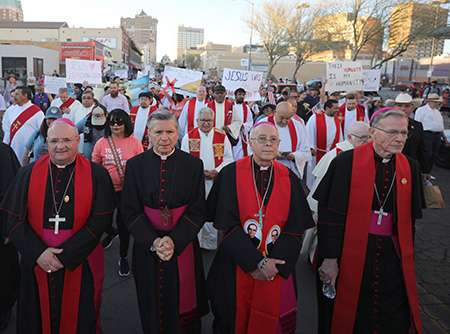
A letter from more than 40 faith leaders of several faith traditions — made public by Archbishop John C. Wester of Santa Fe, New Mexico, on June 26 — urged senators to reject the bill.
“We, the undersigned faith leaders, write to ask for your opposition to HR 1, the budget reconciliation legislation currently being considered by the U.S. Senate,” the letter said. “We believe that the changes made by the U.S. Senate to the legislation are insufficient and do not significantly mitigate its adverse effects.”
Archbishop Wester, who was joined by 19 U.S. bishops in signing the letter, told OSV News they thought it would be “a good idea for faith leaders to come together to express our deep and profound concern about this bill, because it’s going to hurt and harm so many people, particularly immigrants and families and those who depend on the government to assist them for their medical needs.”
“This (legislation) is really violating our Catholic social teaching in terms of a preferential option for the poor, welcoming the stranger in our midst, the common good, subsidiarity,” he said. “It’s a very draconian kind of a bill that seems to have little or no regard for the people that will be affected by it.”
The letter objected to allocating millions of dollars to the government’s mass deportation campaign, expressing concern that campaign would also infringe upon their houses of worship.
“We have already witnessed a reduction in attendance at many of our religious services in our denominations, as the threat of enforcement has deterred many families from practicing their faith,” the letter said.
It also objected to “severe cuts in healthcare coverage and food assistance to millions of both low-income citizens and legal residents, including asylum-seekers and refugees.” It argued those cuts would drive them “deeper into poverty.”
“From our various faith perspectives, the moral test of a nation is how it treats those most in need of support. In our view, this legislation will harm the poor and vulnerable in our nation, to the detriment of the common good,” the letter said. “Its passage would be a moral failure for American society as a whole.”
Among the bishops leading dioceses joining Archbishop Wester were Cardinal Robert W. McElroy of Washington; Cardinal Joseph W. Tobin of Newark, New Jersey; Bishop Steven Biegler of Cheyenne, Wyoming; Bishop John P. Dolan of Phoenix; Archbishop Paul D. Etienne of Seattle; Bishop Joseph R. Kopacz of Jackson, Mississippi; Bishop Michael M. Pham of San Diego; Archbishop Mitchell T. Rozanski of St. Louis; Bishop Jaime Soto of Sacramento, California; Bishop John Stowe of Lexington, Kentucky; Bishop Joseph J. Tyson of Yakima, Washington; and Archbishop Edward J. Weisenberger of Detroit. Retired Bishop Nicholas DiMarzio of Brooklyn, New York, several other auxiliary bishops, and representatives of the Sisters of Mercy of the Americas rounded out the Catholic signatories on that letter, which also included representatives from Protestant, Jewish and Islamic faith traditions.
The diversity of signatories, Archbishop Wester told OSV News, “are very reflective of the deep-felt concern among so many people across the country for the immigrants and for our fellow citizens who will suffer because of this bill.”
In a separate letter issued the same day through the U.S. Conference of Catholic Bishops, the conference commended senators for “provisions that promote the dignity of human life and support parental choice in education” in that legislation. But it also made clear “drastic changes” to the legislation are needed to prevent “provisions that will harm the poor and vulnerable.”
In a statement, Archbishop Timothy P. Broglio of the U.S. Archdiocese for the Military Services, president of the USCCB, said, “Congress must be consistent in protecting human life and dignity.”
“As Pope Leo XIV recently stated, it is the responsibility of politicians to promote and protect the common good, including by working to overcome great wealth inequality,” Archbishop Broglio said. “This bill does not answer this call. It takes from the poor to give to the wealthy. It provides tax breaks for some while undermining the social safety net for others through major cuts to nutrition assistance and Medicaid. It fails to protect families and children by promoting an enforcement-only approach to immigration and eroding access to legal protections. It harms God’s creation and future generations through cuts to clean energy incentives and environmental programs.”
Citing the letter the conference sent to senators, Archbishop Broglio said he urged them to “think and act with courage and creativity to protect human dignity for all, to uphold the common good, and to change provisions that undermine these fundamental values.”
The letter from the bishops’ conference said that it supports provisions that would strip some taxpayer funds from Planned Parenthood, one promoting school choice, and another they said would incentivize charitable giving and development.
However, they objected to Medicaid and SNAP cuts, cuts to environmental efforts, and to an increase in funds for “punitive” immigration policies.
“We urge you to remain consistent in protecting human life and dignity by pursuing a better way forward that protects rather than harms poor and vulnerable people,” the letter said. “Before advancing this bill, we ask you to think and act with courage and creativity to preserve human dignity and uphold the common good and to change the provisions that undermine these fundamental values.”
Asked about the USCCB’s letter to senators, Archbishop Wester said he was “pleased that the USCCB did list in their letter their objections to the bill.”
“I think that was a good thing from my perspective,” he said, adding that his own personal view, and that of the signatories on the interfaith letter, is that “this bill is so awful that it has to be rejected out of hand.”
Meanwhile, several pro-life groups are urging senators to approve the bill based on the provision that would strip some funds from Planned Parenthood. While Planned Parenthood has warned the decision could lead to the closure of 200 out of its 600 nationwide clinics, it is not clear how many lives would be saved from abortion as a result.
A #WeCount report published in June shows abortion in the U.S. has actually increased after the Dobbs v. Jackson Women’s Health Organization decision, in part due to an uptick in abortion facilitated by telehealth abortion providers.
Asked about how he would respond to those who support the One Big Beautiful Bill Act due to that provision, Archbishop Wester said abortion is “a terrible scourge.” But he emphasized if more people are “forced deeper into poverty,” it would likely further increase the abortion rate.
“We know there’s a direct correlation between poverty and abortions,” Archbishop Wester said. “In my estimation, this bill is probably going to increase the gap.”
Abortion in the U.S. is heavily correlated with poverty and low incomes. Guttmacher Institute, which supports legal abortion, reported 75% of women seeking abortion were low-income, with 50% below the federal poverty line. About six out of 10 women seeking abortion were already mothers. The top concerns reported included not being able to afford another child, losing the ability to work or continue education, or having to care for dependents or other family responsibilities.
Republicans hold 53 seats in the Senate, and can only afford three defections from their members if they are to pass the bill without any Democratic support.
(Kate Scanlon is a national reporter for OSV News covering Washington. Follow her on X @kgscanlon.)
Por Justin McLellan, Catholic News Service
CIUDAD DEL VATICANO (CNS) — Casi cuatro años después de que el Papa Francisco abriera el camino de la Iglesia Católica hacia la sinodalidad — un término que muchos en la Iglesia desconocían — , su sucesor ha dado su apoyo a la última etapa del camino sinodal.
El Sínodo de los Obispos, que admitió con derecho a voto a mujeres, laicos y otros no obispos durante sus dos asambleas universales de octubre de 2023 y 2024, “conserva naturalmente su identidad institucional, al tiempo que se enriquece con los frutos madurados en esta temporada”, declaró el Papa León XIV al consejo ordinario del sínodo el 26 de junio. “Y ustedes son el cuerpo encargado de recoger estos frutos y de participar en una reflexión orientada hacia el futuro”.
Durante dos días, el consejo se reunió para aprobar un documento para la etapa final de implementación del sínodo, destinado a mejorar el diálogo entre las iglesias locales y la oficina sinodal del Vaticano, según informó la Secretaría General del Sínodo de los Obispos en un comunicado el 30 de junio. El documento se publicará el 7 de julio en www.synod.va.
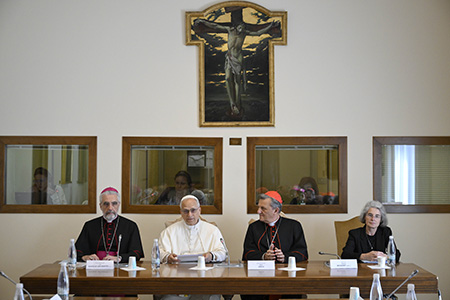
El consejo también analizó la labor de los grupos de estudio instituidos por el Papa Francisco para abordar temas polémicos, como la ordenación femenina y los cambios en la formación sacerdotal.
Los grupos de estudio debían presentar informes provisionales sobre sus conclusiones en junio de 2025, pero la oficina sinodal señaló que, debido al fallecimiento del papa Francisco y a la elección del papa León XIV, se han producido retrasos. De acuerdo con el Papa León XIV, la fecha límite para presentar los informes finales se extendió hasta el 31 de diciembre de 2025, y los informes provisionales se publicarán en el sitio web de la oficina sinodal a medida que se reciban, según se indicó.
Según la constitución apostólica “Universi Dominici Gregis”, que rige los procedimientos cuando el papado está vacante, un concilio o Sínodo de Obispos se suspende inmediatamente cuando un papa fallece o renuncia. Todas las reuniones, decisiones y promulgaciones deben cesar hasta que un nuevo papa ordene explícitamente su continuación; de lo contrario, se considerarán nulas.
El difunto Papa inauguró la fase diocesana del proceso sinodal mundial en octubre de 2021, programada originalmente para culminar con una asamblea presencial en Roma en octubre de 2023. Tras un año de escucha, se celebró otra asamblea en octubre de 2024, y en marzo, el Papa Francisco inauguró una fase de implementación del sínodo de tres años que culminará en una asamblea eclesial en el Vaticano en octubre de 2028.
El Papa León XIII dijo al consejo ordinario del sínodo el 26 de junio: “Los animo en esta labor, rezo para que sea fructífera y desde ahora les estoy agradecido”.
La Secretaría General del Sínodo de los Obispos afirmó que el documento, titulado “Pistas para la fase de implementación del Sínodo”, es una guía práctica y teológica para los obispos diocesanos y los equipos sinodales en la aplicación local de las propuestas finales del sínodo.
La oficina sinodal señaló que esta fase del proceso sinodal “corresponde sobre todo a las Iglesias locales”, encargadas de traducir las “propuestas autorizadas” de la asamblea sinodal en prácticas pastorales concretas en sus respectivos contextos. Al mismo tiempo, la oficina sinodal afirmó que las directrices se elaboraron para responder a las preguntas planteadas por obispos y líderes diocesanos en los últimos meses y que su objetivo es apoyar, no sustituir, el discernimiento local.
El cardenal Mario Grech, secretario general del Sínodo de los Obispos, reconoció en su discurso inaugural de la reunión del consejo que persisten “dificultades y resistencias” al proceso sinodal. Añadió que, si bien algunas diócesis ya han comenzado la fase de implementación con entusiasmo, otras esperan con inquietud las próximas directrices.
“Estas posiciones contrarias no deben pasarse por alto”, afirmó. “Más bien, diría que deben interpelarnos profundamente”.
El cardenal Grech propuso establecer un foro permanente, al que denominó “Mesa de la Sinodalidad”, para fomentar la reflexión teológica y canónica continua sobre la sinodalidad y alentó una mayor inversión en programas de formación. También afirmó que las nuevas colaboraciones con instituciones académicas y el apoyo continuo a jóvenes teólogos contribuirían a cultivar una mentalidad sinodal en toda la Iglesia.
Por Kimberley Heatherington, OSV News
(OSV News) — Fue uno de los temas más polémicos de las elecciones presidenciales estadounidenses de 2024 y ahora es un componente — estimado en 170.000 millones de dólares — de la versión del Senado del “Gran y hermoso proyecto de ley” de la administración Trump: la aplicación de la ley de inmigración y la deportación.
El proyecto de ley — llamado en inglés “Big Beautiful Bill” o OBBB — fue aprobado por el Senado el 1 de julio, después del voto decisivo del vicepresidente JD Vance para desempatar la votación de 50-50, y que volvió a la Cámara de Representantes para su aprobación definitiva. A través de la red social X, Vance argumentó que la aplicación agresiva de las leyes de inmigración merecía los recortes del proyecto de ley en las ayudas sociales (a los que se oponen los obispos estadounidenses) y los varios billones de dólares que se prevé que se añadan a la deuda nacional.
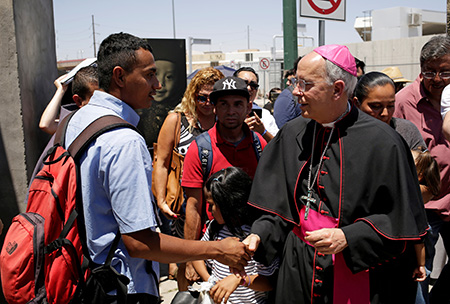
“Lo que llevará a este país a la bancarrota más que cualquier otra política, es inundarlo de inmigración ilegal y luego conceder a esos migrantes generosos beneficios. La OBBB soluciona este problema y, por lo tanto, debe aprobarse”, argumentó Vance, católico, en X antes de la aprobación del proyecto de ley, y añadió: “Todo lo demás — la puntuación de la CBO, la base de referencia adecuada, los detalles de la política de Medicaid — es irrelevante en comparación con el dinero del ICE y las disposiciones de control de la inmigración”.
La reacción católica tanto a las propuestas de inmigración del proyecto de ley de 940 páginas como a los acontecimientos relacionados que han ido ocurriendo, parece haber seguido una línea cautelosa entre el cumplimiento y la preocupación por las redadas diarias que los funcionarios del Servicio de Inmigración y Control de Aduanas llevan a cabo en barrios, lugares de trabajo y estacionamientos de tiendas de costa a costa, con la conciencia de que el testimonio de la Iglesia Católica será observado tanto por el público como por los políticos.
“Todos estamos de acuerdo en no queremos aceptar en nuestras comunidades a esos inmigrantes indocumentados que son terroristas conocidos o criminales violentos”, dijo el arzobispo de Los Ángeles, José H. Gomez, el 9 de junio, tras los disturbios en la ciudad. “Pero no hay necesidad de que el gobierno lleve a cabo operaciones de inmigración de una manera que provoque miedo y ansiedad entre los inmigrantes comunes y trabajadores y sus familias”.
Los datos del ICE publicados el 16 de junio indican que menos del 10% de las personas detenidas desde octubre de 2024 han sido acusadas de delitos violentos, y más del 75% no tenían antecedentes más que infracciones de tráfico o de inmigración.
Ese mismo día, el arzobispo Timothy P. Broglio, presidente de la Conferencia de Obispos Católicos de Estados Unidos, publicó una reflexión antes de un retiro de una semana de la USCCB — como se le conoce a la conferencia episcopal por sus siglas en inglés — en California.
“En el contexto de un sistema migratorio seriamente deficiente, el arresto masivo y la remoción de nuestros vecinos, amigos y familiares basados solamente en su estado migratorio, especialmente en forma arbitraria o sin el debido proceso, representa una profunda crisis social ante la cual ninguna persona de buena voluntad puede permanecer en silencio”, afirmó el arzobispo Broglio, quien también dirige la Arquidiócesis de los Servicios Militares de Estados Unidos, en la traducción oficial de la USCCB de este mensaje.
“La situación está lejos de la comunión de vida y amor a la cual esta nación de inmigrantes debería aspirar”, añadió.
Al igual que el arzobispo Gomez, dijo que las medidas policiales “dirigidas a preservar el orden y garantizar la seguridad” son “necesarias para el bien común”, pero también declaró: “Los esfuerzos actuales van mucho más allá de individuos con antecedentes criminales”.
Antes de que la Cámara de Representantes y el Senado aprobaran sus respectivos proyectos de ley, la USCCB envió una carta a cada una de las cámaras del Congreso en relación con el proyecto de ley de Trump, “tanto para elogiar ciertas disposiciones importantes, como para instar encarecidamente a que se reconsideren las disposiciones que perjudicarán a los pobres y desfavorecidos, así como a nuestros hermanos y hermanas inmigrantes”.
“Muchas disposiciones de este paquete también refuerzan un enfoque insostenible de la inmigración basado únicamente en la aplicación de la ley, al tiempo que colocan injustamente a las familias inmigrantes y de estatus mixto en una profunda desventaja”, afirmaba la carta de los obispos. “Entre ellas se encuentran disposiciones que penalizan a las familias que hacen todo lo posible por cumplir la ley, incluidas aquellas que huyen de la persecución”.
“También nos preocupa profundamente el nivel sin precedentes de financiación obligatoria que intensificaría la aplicación de la ley mucho más allá de los objetivos legítimos de promover la seguridad pública y llevar ante la justicia a quienes cometen delitos”, añadieron los obispos. “Estas disposiciones son contrarias al bien común”.
J. Kevin Appleby, investigador principal de política y comunicaciones del Centro de Estudios Migratorios de la ciudad de Nueva York y exdirector de política migratoria y asuntos públicos de la USCCB entre 1998 y 2016, predijo que estas tácticas de aplicación de la ley tendrán un profundo impacto en el catolicismo estadounidense.
“Este proyecto de ley incrementará las redadas de inmigración, las detenciones masivas y la separación de familias en todo el país, afectando a las familias inmigrantes que acuden a misa todos los domingos”, afirmó. “También afectará negativamente a la Iglesia en Estados Unidos como institución, ya que veremos más actividades de agentes de la ley en torno a las parroquias, con una disminución de la asistencia a Misa. La libertad religiosa debe aplicarse a todas las personas, no solo a los ciudadanos estadounidenses”.
Appleby también instó a los obispos estadounidenses a ser aún más contundentes en su oposición.
“La comunidad católica, ya sean los obispos o los feligreses individuales, debe oponerse firmemente a esta legislación, ya que viola muchos aspectos de la doctrina católica al perjudicar a los pobres y a los migrantes”, enfatizó. “Desde una perspectiva provida, podría aumentar el número de abortos, ya que este proyecto de ley podría empujar a la pobreza a un número significativo de mujeres con bajos ingresos”.
El aborto en Estados Unidos está muy relacionado con la pobreza y los bajos ingresos. El Instituto Guttmacher, que apoya el aborto legal, informó que el 75% de las mujeres que solicitan un aborto tienen bajos ingresos y el 50% están por debajo del umbral federal de pobreza. Aproximadamente seis de cada diez mujeres que solicitan un aborto ya son madres. Entre las principales preocupaciones señaladas se encuentran no poder criar otro hijo, perder la capacidad de trabajar o continuar con la educación o tener que cuidar de personas dependientes u otras responsabilidades familiares.
Honestamente, dijo Appleby, los obispos deberían estar gritando desde sus púlpitos contra este proyecto de ley, ya que está en juego la credibilidad de la voz moral de la Iglesia.
“Realmente es uno de los proyectos de ley de control de la inmigración con más repercusiones que hemos visto en décadas”, observó Dylan Corbett, consultor de la USCCB y director ejecutivo del Hope Border Institute, una organización de base que defiende los derechos de los inmigrantes y que trabaja en la región de El Paso, Texas, Ciudad Juárez, México, y Las Cruces, Nuevo México.
“Es la última pieza para sentar las bases de las deportaciones masivas”, afirmó Corbett. “Y es una inversión sin precedentes con un enfoque solo de aplicación de la ley, que perjudicará a las familias de comunidades de todo el país. Se trata de un enfoque exclusivamente punitivo para gestionar la inmigración en nuestro país”.
Según el Instituto CATO, con sede en Washington, el gasto en inmigración y control fronterizo representa dos tercios de los fondos federales destinados a la aplicación de la ley en el año fiscal 2025.
“Estamos criminalizando a nuestros hermanos y hermanas inmigrantes a costa de los pobres”, argumentó Corbett. “Estamos recortando programas de servicios sociales esenciales, como los programas de Medicaid que protegen la vida; programas que garantizan que podamos proporcionar asistencia médica a los niños adoptados. Estamos recortando estos programas para invertir en este enfoque sin sentido”.
“Creo que este proyecto de ley no se puede corregir”, añadió. “Tenemos que tirarlo a la basura y empezar de nuevo”.
Corbett y sus colegas se encuentran, dada su ubicación, en el centro de las acciones de inmigración y deportación.
“Aquí, en El Paso, todos los días se deporta a personas cuando sus casos son desestimados por los jueces”, informó Corbett. “En cuanto salen de la sala del tribunal, son deportados”.
Daniel Di Martino, miembro del Instituto Manhattan, un grupo de expertos con sede en Nueva York “dedicado al estado de derecho en Estados Unidos”, recomendó en un reciente informe que el Congreso contrate a 250 jueces de inmigración adicionales al año durante los próximos cuatro años para reducir la acumulación de casos; aplicar la norma de “último en entrar, primero en salir” para tramitar los casos de asilo; y cobrar a los solicitantes de asilo “una tarifa de tramitación razonable” de 1000 dólares, además de lo que muchos ya pagan por los abogados que contratan. La tarifa, según Di Martino, “desalentaría las solicitudes sin fundamento”.
Corbett, al igual que los arzobispos Gómez y Broglio, reconoce la responsabilidad del Estado de proteger a las comunidades. Pero él también se pregunta si “están persiguiendo a personas que representan una amenaza para nuestras comunidades o si simplemente han tirado a la basura las prioridades de aplicación de la ley y están persiguiendo a todo el mundo, incluidas personas que llevan aquí décadas, familias y personas que contribuyen económicamente”.
El arzobispo Thomas G. Wenski, de Miami, manifestó recientemente esa misma preocupación en la edición del 11 de junio de su columna arquidiocesana, señalando que “una campaña de deportación masiva, financiada con esta legislación, resultará perjudicial para el futuro de nuestra nación, ya que se expulsará a residentes que han vivido mucho tiempo en el país con hijos ciudadanos estadounidenses que trabajan duro y contribuyen a nuestra economía y cultura. Esto no beneficia los intereses a largo plazo ni los valores de nuestro país”.
David Spicer, subdirector de políticas de los Servicios de Migración y Refugiados de la USCCB, dijo que las asignaciones sin precedentes del “Big Beautiful Bill” representan un aumento de casi el 400% en los fondos para detenciones con respecto a la asignación presupuestaria anterior.
“Con esta cantidad de dinero, el ICE podría financiar la detención de inmigrantes con una capacidad casi igual a la de todo el sistema penitenciario federal”, afirmó. “Las familias y las personas sin antecedentes penales, incluidas aquellas con cónyuges e hijos ciudadanos estadounidenses, serían aún más susceptibles al tipo de medidas de aplicación de la ley indiscriminadas y aleatorias que ya estamos empezando a ver en muchos lugares”.
“Esto sería totalmente contrario al llamamiento constante de los obispos para que la aplicación de las leyes de inmigración sea selectiva, proporcionada y humana”, añadió Spicer, “y contribuiría poco o nada a promover la seguridad pública”.
Tanto la Cámara de Representantes como el Senado anulan las protecciones para los menores no acompañados que no son ciudadanos, dijo también Spicer, imponiendo tarifas y proporcionando fondos para la expulsión acelerada, independientemente de la edad, sin acceso a asistencia legal. Ambas versiones imponen además nuevas y mayores tarifas para una serie de servicios de inmigración, como los permisos de trabajo y las solicitudes básicas presentadas en los procedimientos judiciales de inmigración.
El efecto práctico de tales tarifas — que son “insuperables” y “exorbitantes” para los migrantes, subrayó Spicer — es que “incluso alguien con la solicitud de asilo bien fundamentada, que puede demostrar con certeza que se enfrentará en su país de origen a una persecución que pone en peligro su vida, podría ver denegada la ayuda en Estados Unidos si no tiene la capacidad de pagarla”.
También se elimina la elegibilidad para los programas de asistencia alimentaria SNAP a los no ciudadanos que residen legalmente en los Estados Unidos, así como la elegibilidad de algunas familias de estatus mixto para el crédito tributario por hijos, es decir, se prohíbe a los padres no ciudadanos sin número de Seguro Social reclamar el crédito por un hijo ciudadano.
“Lamentablemente, el impacto general de este proyecto de ley sería debilitar nuestro sistema de inmigración legal, al tiempo que proporcionaría una afluencia masiva de recursos para la aplicación de la ley de inmigración, lo que tendría un efecto desproporcionado en las familias y los niños”, dijo Spicer. “Mientras tanto, el Congreso podría estar trabajando en una reforma migratoria significativa que reconozca las contribuciones esenciales de los inmigrantes y responda a las necesidades de las comunidades estadounidenses”.
(Kimberley Heatherington escribe para OSV News desde Virginia.)
Por Kate Scanlon, OSV News
WASHINGTON (OSV News) — Veinte obispos católicos estadounidenses se han sumado a una iniciativa interreligiosa en contra del Gran y Hermoso Proyecto de Ley (One Big Beautiful Bill Act), que promulgaría disposiciones clave de la agenda legislativa del presidente Donald Trump en materia de impuestos e inmigración, calificándola de “fracaso moral”.
El Senado está redactando su versión de la ley presupuestaria que los republicanos de la Cámara de Representantes aprobaron en mayo, bajo unas normas que permitirían su aprobación por mayoría simple y evitarían el obstruccionismo parlamentario. Trump ha pedido al Senado que apruebe el proyecto de ley no más tarde del 4 de julio.
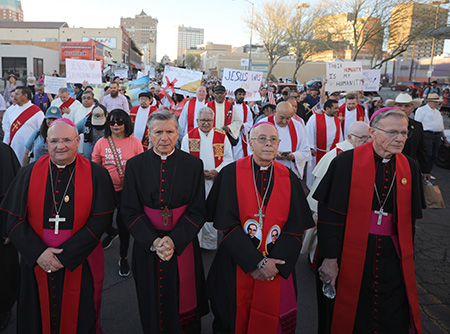
Una carta de más de 40 líderes de varias corrientes religiosas, promulgada por el arzobispo John C. Wester de Santa Fe, Nuevo México, el 26 de junio, instaba a los senadores a rechazar el proyecto de ley.
“Nosotros, los líderes religiosos abajo firmantes, les escribimos para pedirles que se opongan a la HR 1, la ley de reconciliación presupuestaria que está siendo estudiada actualmente por el Senado de los Estados Unidos”, decía la carta. “Creemos que los cambios introducidos por el Senado de los Estados Unidos en la ley son insuficientes y no mitigan significativamente sus efectos adversos”.
El arzobispo Wester, al que se unieron 19 obispos estadounidenses para firmar la carta, declaró a OSV News que pensaban que sería “una buena idea que los líderes religiosos se unieran para expresar nuestra profunda preocupación por este proyecto de ley, porque va a perjudicar y dañar a mucha gente, en particular a los inmigrantes y las familias y a aquellos que dependen de la ayuda del Gobierno para sus necesidades médicas”.
“Esta (legislación) viola realmente nuestra doctrina social católica en lo que se refiere a la opción preferencial por los pobres, la acogida al extranjero en medio de nosotros, el bien común y la subsidiariedad”, afirmó. “Es un proyecto de ley muy draconiano que parece tener poca o ninguna consideración por las personas que se verán afectadas por él”.
La carta manifestó oposición a la asignación de millones de dólares a la campaña de deportación masiva del Gobierno y expresó su preocupación por que dicha campaña también pudiera afectar a sus lugares de culto.
“Ya hemos sido testigos de una reducción en la asistencia a muchos de nuestros servicios religiosos en nuestras denominaciones religiosas, ya que la amenaza de la aplicación de la ley ha disuadido a muchas familias de practicar su fe”, decía la carta.
También se opone a “los severos recortes en la cobertura de cuidado de salud y la ayuda alimentaria a millones de ciudadanos y residentes legales con bajos ingresos, incluyendo a los solicitantes de asilo y los refugiados”. Argumenta que esos recortes los empujarían “a una pobreza aún mayor”.
“Desde nuestras diversas perspectivas religiosas, la prueba moral de una nación es cómo trata a los más necesitados. En nuestra opinión, esta legislación perjudicará a los pobres y vulnerables de nuestra nación, en detrimento del bien común”, decía la carta. “Su aprobación sería un fracaso moral para la sociedad estadounidense en su conjunto”.
Entre los obispos que lideran diócesis que se unieron al arzobispo Wester se encontraban: el cardenal Robert W. McElroy, de Washington; el cardenal Joseph W. Tobin, de Newark, Nueva Jersey; el obispo Steven Biegler, de Cheyenne, Wyoming; el obispo John P. Dolan, de Phoenix; el arzobispo Paul D. Etienne, de Seattle; el obispo Joseph R. Kopacz, de Jackson, Misisipi; el obispo Michael M. Pham, de San Diego; el arzobispo Mitchell T. Rozanski, de San Luis; el obispo Jaime Soto, de Sacramento, California; el obispo John Stowe, de Lexington, Kentucky; el obispo Joseph J. Tyson, de Yakima, Washington; y el arzobispo Edward J. Weisenberger, de Detroit. El obispo emérito Nicholas DiMarzio, de Brooklyn, Nueva York, varios otros obispos auxiliares y representantes de las Hermanas de la Misericordia de las Américas completaron la lista de firmantes católicos de esa carta, que también incluyó a representantes de las tradiciones religiosas protestante, judía e islámica.
La diversidad de los firmantes, dijo el arzobispo Wester a OSV News, “refleja muy bien la profunda preocupación de tantas personas en todo el país por los inmigrantes y por nuestros conciudadanos que sufrirán a causa de este proyecto de ley”.
En otra carta publicada el mismo día a través de la Conferencia de Obispos Católicos de Estados Unidos (USCCB), la conferencia elogió a los senadores por “las disposiciones que promueven la dignidad de la vida humana y apoyan la elección de los padres en materia de educación” en esa misma legislación. Pero también dejó claro que se necesitan “cambios drásticos” en la legislación para evitar “disposiciones que perjudicarán a los pobres y vulnerables”.
En una declaración, el arzobispo Timothy P. Broglio, de la Arquidiócesis de los Servicios Militares de Estados Unidos y presidente de la USCCB, afirmó: “El Congreso debe ser coherente en la protección de la vida y la dignidad humanas”.
“Como afirmó recientemente el Papa León XIV, es responsabilidad de los políticos promover y proteger el bien común, lo que incluye trabajar para superar la gran desigualdad económica”, afirmó el arzobispo Broglio. “Este proyecto de ley no responde a ese llamado. Quita a los pobres para dar a los ricos. Ofrece exenciones fiscales a algunos mientras socava la red de seguridad social para otros mediante importantes recortes en la asistencia nutricional y Medicaid. No protege a las familias ni a los niños al promover un enfoque de la inmigración basado únicamente en la aplicación de la ley y erosionar el acceso a la protección legal. Perjudica a la creación de Dios y a las generaciones futuras mediante recortes en los incentivos a las energías limpias y en los programas medioambientales”.
Citando la carta que la conferencia envió a los senadores, el arzobispo Broglio dijo que les instó a “pensar y actuar con valentía y creatividad para proteger la dignidad humana de todos, defender el bien común y cambiar las disposiciones que socavan estos valores fundamentales”.
La carta de la conferencia episcopal apoya las disposiciones que retirarían algunos fondos de los contribuyentes a Planned Parenthood, una disposición que promueve la libre elección de escuela y otra que, según ellos, incentivaría las donaciones benéficas y el desarrollo.
Sin embargo, se opusieron a los recortes de Medicaid y SNAP, a los recortes en las iniciativas medioambientales y al aumento de los fondos para políticas de inmigración “represivas”.
“Les instamos a que sigan siendo coherentes en la protección de la vida y la dignidad humana, buscando una mejor manera de avanzar que proteja, en lugar de perjudicar, a las personas pobres y vulnerables”, según la carta. “Antes de sacar adelante este proyecto de ley, les pedimos que piensen y actúen con valentía y creatividad para preservar la dignidad humana y defender el bien común, y que modifiquen las disposiciones que socavan estos valores fundamentales”.
Cuando se le preguntó por la carta de la USCCB a los senadores, el arzobispo Wester dijo que estaba “satisfecho de que la USCCB hubiera incluido en su carta sus objeciones al proyecto de ley”.
“Creo que fue algo positivo desde mi punto de vista”, afirmó, y añadió que su opinión personal, y la de los firmantes de la carta interreligiosa, es que “este proyecto de ley es tan terrible que debe ser rechazado de plano”.
Mientras tanto, varios grupos provida están instando a los senadores a que aprueben el proyecto de ley basándose en la disposición que retiraría algunos fondos a Planned Parenthood. Aunque Planned Parenthood ha advertido de que la decisión podría provocar el cierre de 200 de sus 600 clínicas en todo el país, no está claro cuántas vidas se salvarían del aborto como resultado.
Un informe de #WeCount publicado en junio muestra que el aborto en Estados Unidos efectivamente ha aumentado tras la decisión del caso Dobbs vs. Jackson Women’s Health Organization, en parte debido al aumento de los abortos facilitados por los proveedores de abortos a distancia.
Cuando se le preguntó cómo respondería a quienes apoyan la One Big Beautiful Bill Act debido a esa disposición, el arzobispo Wester dijo que el aborto es “un terrible flagelo”. Pero enfatizó que si más personas se ven “empujadas a una pobreza aún mayor”, es probable que la tasa de abortos aumente aún más.
“Sabemos que existe una correlación directa entre la pobreza y los abortos”, dijo el arzobispo Wester. “En mi opinión, este proyecto de ley probablemente aumentará la brecha”.
El aborto en Estados Unidos está fuertemente correlacionado con la pobreza y los bajos ingresos. El Instituto Guttmacher, que apoya el aborto legal, informó que el 75% de las mujeres que buscan abortar son de bajos ingresos y el 50% estaban por debajo del umbral federal de pobreza. Aproximadamente seis de cada diez mujeres que solicitan un aborto ya son madres. Entre las principales preocupaciones señaladas se encuentran no poder permitirse tener otro hijo, perder la capacidad de trabajar o continuar con la educación, o tener que cuidar de personas dependientes u otras responsabilidades familiares.
Los republicanos ocupan 53 escaños en el Senado y solo pueden permitirse tres deserciones de sus miembros si quieren aprobar el proyecto de ley sin el apoyo de los demócratas.
(Kate Scanlon es una reportera nacional de OSV News que cubre Washington. Síguela en X @kgscanlon.)
By Joe Lee
MADISON – Ed Donohoe didn’t fly nearly as far as Father Frank Cosgrove’s family members from Ireland to see the beloved priest celebrate Mass and mark the 60th anniversary of his ordination, an event which took place June 2 at St. Francis of Assisi Church in Madison.
But 1,200 miles was a long way for Donohoe to travel, and not an inexpensive trip. Why was it so important for him to join the celebration across the country?
“Because Father Frank was like family,” said Donohoe, a Colorado resident who had just reported for duty at the Meridian Naval Air Station in 2008 when they met. Father Frank, then pastor of St. Patrick Church, would drive half an hour to the base chapel to celebrate Mass. It wasn’t long before he and Donohoe grew close.
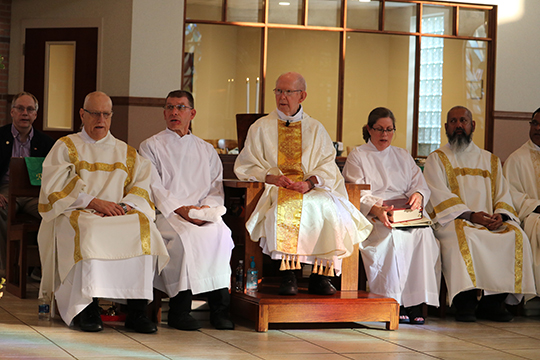
Cosgrove family members, including Father Frank’s brother Eamonn, his sister Ruth, and great nephews who were making their first trip to the U.S., flew over 4,000 miles to take part in the service and enjoy the reception. More than 50 priests from all over the Catholic Dioceses of Jackson and Biloxi came to support him, and Catholics from all over Mississippi (and a surprising number of non-Catholics) packed the St. Francis sanctuary.
They heard a homily that drew from his brand-new memoir, “Sir, Do You Know Where You Are Going?” and touched often on unity.
“The celebration means a great deal to me,” said Ralph Eubanks, who has known Father Frank since he was a student at Ole Miss two generations ago, back when Father Frank pastored at St. John Church. “He was devoted to the truth, he called out the sin of racism, and he believes in bringing people together.”
“He married my parents (Ed and Cindy Hannan) 48 years ago,” said St. Francis parishioner Anabeth Hannan Duncan. “He baptized me 31 years ago and married me three years ago. We have Christmas Eve with him every single year. When I think of God, I see Father Frank, imagining him a few feet taller.”
“Father Frank and I go back to 1969, when he was associate pastor at St. Peter,” said Charlene Bearden. “He made a way for me to have an audience with Pope St. John Paul II in 1987 when he was in New Orleans. This was through the National Black Catholic Leadership. He’s touched so many lives in so many ways.”
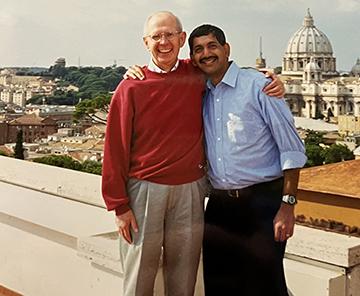
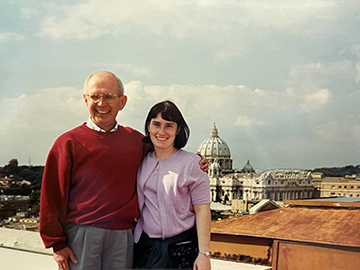
ROME – Father Frank Cosgrove, right, stands with now-Deacon Denzil Lobo on the rooftop of the Pontifical North American College in 2002. Lobo and his wife, Gina, surprised Cosgrove with a visit while he was on sabbatical in Rome. Both attended Cosgrove’s 60th ordination anniversary celebration where they reminisced about the special trip. (Photo courtesy Gina Lobo)
“I’ve known him since I was a teenager when he was our parish priest at Ole Miss,” said Mary Johnson Coyle. “I’ve stayed friends with him my entire adult life. You wanted to be a better Catholic around him. He’s a lovely, great man who brings everyone together.”
“My husband John and I were charter members at St. Francis,” said Mary Kraft. “Father Frank has been wonderful to our family. Our daughter and another little girl started CYO at St. Francis under him. He asked us to be eucharistic ministers, but I told him we would like to be altar servers, and we were the first adult altar servers.”
At the reception in the St. Francis family life center, Father Frank made time for everyone who wanted a hug, a selfie, or a minute or two to say thanks. The celebration lasted well into the night. Father Frank, now in his mid-eighties and slowed by Parkinson’s, was still on his feet with a big smile on his face.
The memoir was a huge hit, selling almost 200 copies at the event. It’s available for $20 while supplies last at parish offices at St. Patrick in Meridian, St. John in Oxford, St. Paul in Flowood, and St. Francis of Assisi in Madison.
Click here to view more photos
(Joe Lee is the Editor-in-Chief of Dogwood Press, and member of St. Francis of Assisi, Madison.)
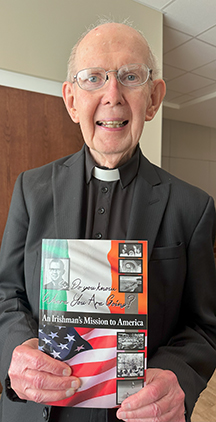
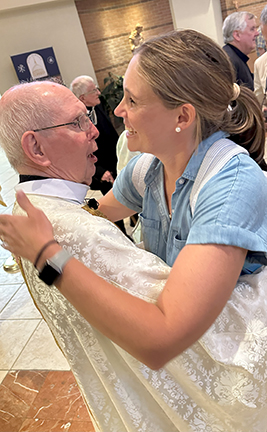

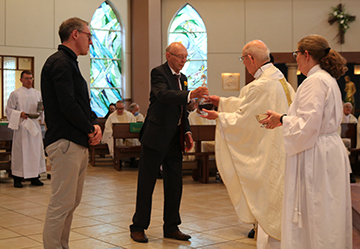
At a place often defined by steel bars and silence, a different kind of transformation is taking place – one built on hope, faith and the enduring light of Christ. Michael Shaw, an inmate and the first officially recognized “Catholic Minister” within his facility, is helping lead that transformation through his involvement in Prison Ministry alongside Father Lincoln Dall.
“I began attending Mass with Father Lincoln back in 2017,” Shaw recalled. “At the time, we were lucky to be allowed to attend twice a month. The calendar often changed due to guard shortages, but for us, that calendar was a flicker of flame leading us out of the darkness – if only for an hour a week. What an incredible hour that was. Through our darkness shines the light of the Lord.”
The onset of the COVID-19 pandemic brought an even deeper understanding of what faith and community meant to Shaw and his fellow inmates. “When we were not able to have Mass, I truly understood the gravity of that darkness,” he said. “Jesus is the only light we have inside these cold and desolate walls, and Father Lincoln was the lightbulb for the true light of Jesus.”
“I no longer just attend Mass,” he shared. “We are now an official church. That title – St. Michael – means the world to us.”
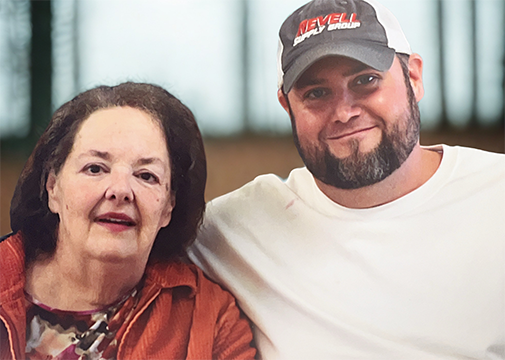
Shaw’s ministry extends far beyond his own personal faith journey. He has mentored dozens of men through RCIA, confirmation and baptism – earning the affectionate title of “Godfather” to many. “I often receive random notes and letters thanking me for what I’ve done,” he said. “These men have become my strength. Prison Ministry has given me a chance to help others, and that has been a gift.”
The Catholic Service Appeal (CSA) has played a vital role in supporting Shaw’s mission. Its donors help fund the programs that make these spiritual transformations possible. Shaw offered both his gratitude and a heartfelt plea.
“To those who have given to the Catholic Service Appeal – thank you,” he said. “You have played a massive role in actively changing the lives and hearts of so many men. Because of your support, we now have over 500 men participating in Catholic-based programs. You’ve helped create opportunities for lost men to feel the love of Christ – and feel found again.”
With continued support, Shaw hopes to reach even more men with the message of hope and healing.
“Thank you for the opportunity you’ve given us,” he added. “And to anyone considering giving to the CSA – know that your gift truly brings the light of Christ into the darkest of places.”
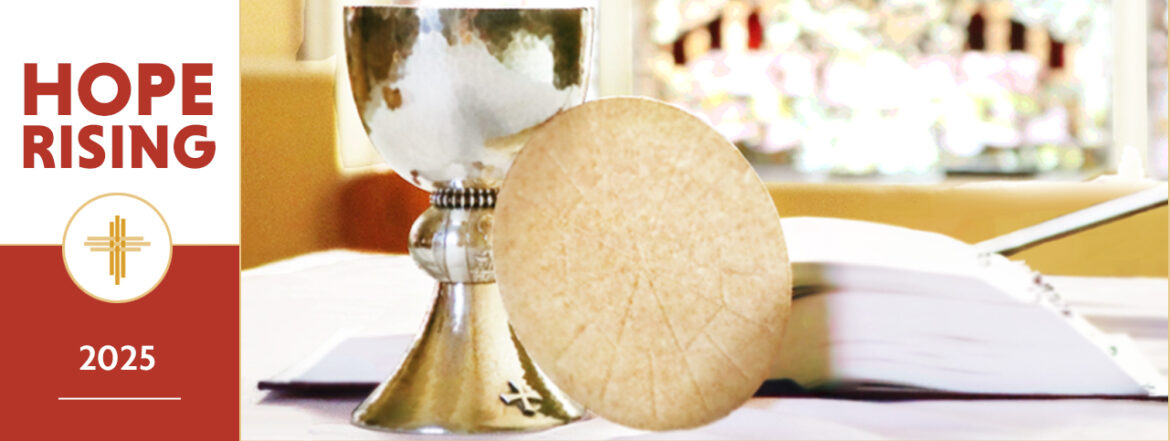
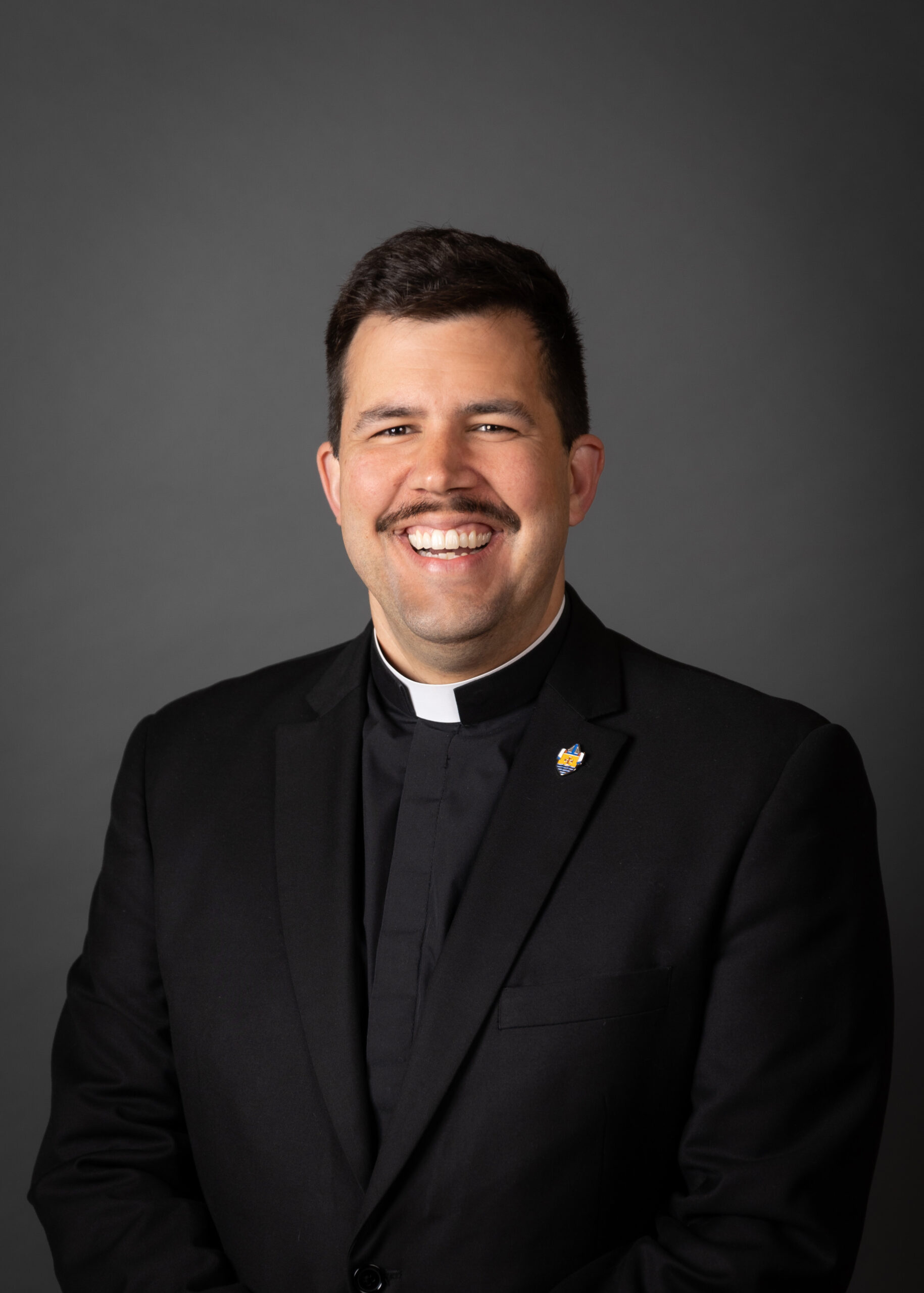
All of our seminarians have begun their summer assignments. It is always exciting to see our guys get to be in parishes and I know how much parishioners from these parishes enjoy getting to know our men. Our seminarians look forward to their summer assignments each year because they get to come out of the classroom and serve the people that they are called to serve!
This year Will Foggo and Francisco Maldonado will have a unique experience as they are assigned together at St. Elizabeth in Clarksdale. You may know that the rectory at St. Elizabeth is quite large, and so I wanted to give those two an opportunity to serve together and I am grateful to Father Raju Macherla for being willing to supervise two men. Grayson Foley is with Father Mark Shoffner in Oxford; Joshua Statham is with Father Rusty Vincent in Vicksburg; and Joe Pearson will be with Father Kent Bowlds in Cleveland after he completes the Institute for Priestly Formation in Omaha, Nebraska in early July. EJ Martin and Wilson Locke are in Mexico for the summer studying Spanish.
Before the summer Father Tristan Stovall and I met with all the pastors who will be serving as supervisors to help them prepare. It is important that our guys are guided through the summer as these assignments really help them discern whether they are called to serve as priests in our diocese. I try to give them varied experiences so they can understand what it will be like if they are called to serve in a suburban parish in the Jackson metro, in a country parish in the Delta, or in a college town.
I also have some exciting information about an upcoming ordination. Will Foggo will be ordained to the transitional diaconate on Saturday, Nov. 29 at 10:30 a.m. at the Cathedral of St. Peter in Jackson. Please save the date and join us! The Egg Bowl, gratefully, is on Friday, Nov. 28, so please enjoy your time over Thanksgiving with your family and watch some good football, then come to pray for Will and support him that Saturday morning. Will’s priestly ordination will be on Saturday, May 16, 2026 at 10:30 a.m. at the Cathedral.
The reason that Will’s ordinations are close together is because the recommendations of the U.S. Bishops recently changed with regard to when men should be ordained to the diaconate. It was suggested that dioceses wait until the candidate is completely done with their academic work so that they can be in the diocese full-time as a deacon. Will’s class was the second class to experience this trial, but after this year we are all reverting back to the old schedule, so he’s getting a unique experience for sure! I am very excited for Will, and I know that he will be a great asset to whichever parishes he gets assigned to.
Thus far we will have three new seminarians joining the fold this August. There are still a couple of applications in process, so I’ll keep you all updated as we go along. Thank you for your prayers and support for our program, they are working! Thanks to all who have given to our Spring Vocations Appeal which is really helping us continue to accompany any young man who is open to a call to the seminary.
Father Nick Adam, vocation director
(For more information on vocations, visit jacksonvocations.com or contact Father Nick at nick.adam@jacksondiocese.org.)